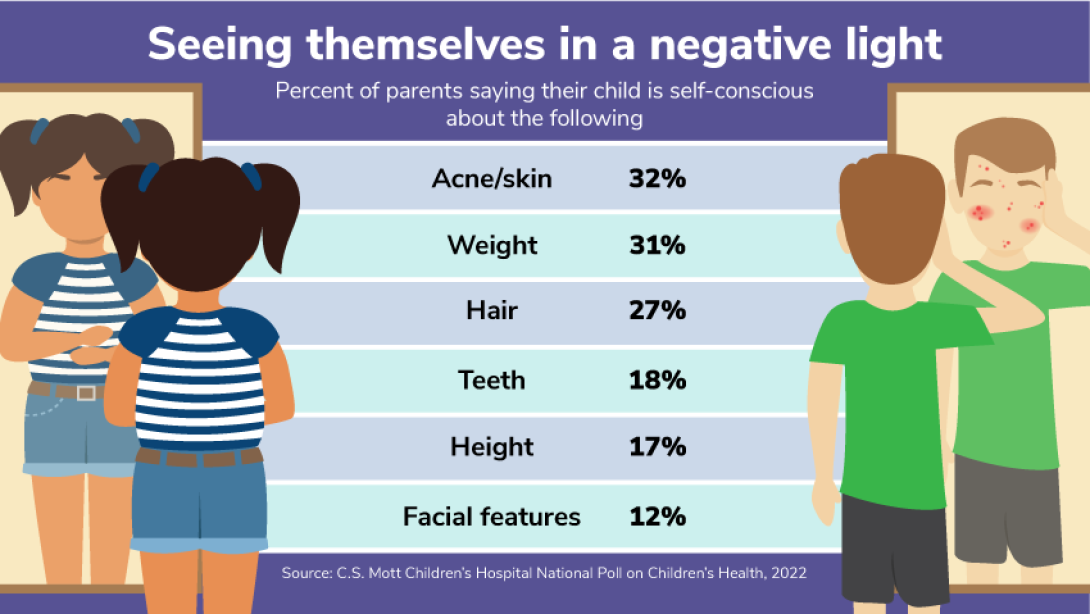2 in 3 parents say their child is self-conscious about their appearance. 5 ways to nurture positive self-image and confidence in young people.
10:05 AM
Author |

The majority of adolescents and teens are self-conscious about their appearance, a new national poll suggests.
Nearly two thirds of parents say their child is insecure about some aspect of their appearance and one in five say their teens avoid scenarios like being in photos because they're too self-conscious, according to the C.S. Mott Children's Hospital National Poll on Children's Health at University of Michigan Health.
"Children begin forming opinions about their bodies and looks at a very young age," said Mott Poll co-director Susan Woolford, M.D. ,M.P.H., a child obesity expert and pediatrician at University of Michigan Health C.S. Mott Children's Hospital
MORE FROM MICHIGAN: Sign up for our weekly newsletter
"These findings reinforce research that as kids receive unhealthy messages about societal ideals, it can lead to a poor self-image of themselves. Left unchecked, a preoccupation with appearance and body dissatisfaction may lead to decreased mental health and emotional well being and increase risks for eating disorders, depression and low self-esteem."
The nationally representative report is based on responses from 1,653 parents with at least one child ages 8-18.
Weight, skin conditions like acne and hair were the most common causes of insecurities, yet fewer parents listed height and facial features. Nearly one in five parents of girls also said their child was self-conscious about their breasts.
Parents of teens are also more likely than parents of younger children ages 8-12 to report their child is insecure about their appearance (73% of teen girls and 69% of teen boys compared to 57% of younger girls and 49% of younger boys.)
"As kids get older, they become more self-aware, are more likely to compare themselves to peers and may be more influenced by media portrayals about beauty and the most desirable body shape, face and look," Woolford said.
"It's developmentally normal for adolescents and teens to experience some insecurities, but if it's interfering with their ability to enjoy social interactions or other activities, they may need help."
It's developmentally normal for adolescents and teens to experience some insecurities, but if it's interfering with their ability to enjoy social interactions or other activities, they may need help.Susan Jennifer Woolford, MD
Nearly a third of parents say they notice their child making negative comments about their appearance. Among parents who say that their child is self-conscious about their looks, nearly one in three feel it has a negative impact on their child's self-esteem while one in five says it affects their child's willingness to participate in certain activities.
Other parents, mostly those of teens, also say their child avoids being in photos, tries to hide their appearance with clothing or restricts what they eat because of insecurities.
Sometimes, negative self-thoughts are also reinforced by others, the poll finds. One in three parents say their child has been treated unkindly because of their appearance most often by other children, strangers or other family members. Parents' most common response is to talk with their child about the incident. Less often, they keep their child away from the person making hurtful statements or speak to the person who made the comments.
Overall, parents polled feel that in-person interactions have a greater impact than social media on their child's view of themselves. However, parents who describe their child as self-conscious about their appearance are twice as likely to say their child is more affected by social media.
Woolford offers parents five ways to nurture positive body and self-image in their kids:

Be a role model of self-love
If a parent is always body bashing themselves or making negative comments about their looks, they can expect children to follow suit.
"Kids are watching every time you step on that scale and sigh about needing to lose weight or point out your own perceived flaws in the mirror," Woolford said. "Lead by example to teach them self-love and respect."
Focus less on looks and instead vocalize appreciation for all the powerful things your body can do, such as helping you feel good through walks, bike rides or swimming.
Embrace body diversity
If you hear your child comment on someone's body size or appearance, whether it's someone they know, on a TV show or a stranger, teach them that people come in different sizes and shapes, and have different features. None of them are bad, just different.
For younger kids, look for children's books that celebrate body diversity and positivity and read them together.
Avoid even "positive" praise for looks
Especially with young girls, adults tend to make well-meaning comments praising children for their beauty, Woolford says.
But this type of emphasis gives significance to physical appearance and reinforces messages that when someone "looks good" they are more valuable, Woolford says. This can exacerbate a young person's worries about the opposite also being true and being self-critical.
Instead, adults should focus on a child's personal qualities, not their body, hair, face or clothing.
Promote family connection through healthy activities
Families should connect through fun movement and healthy eating because they enjoy them, not because they "have to" or someone is on a diet, Woolford says. This promotes healthy habits with a focus on using nutrition and exercise to make your body feel good, not on how it looks and may help ward off unhealthy dieting later in life, she says.
Regular and positive family meals also help parents stay connected to kids and encourage open communication about insecurities and an opportunity to address issues together.
Teach them to critically assess media
Children are surrounded by unrealistic ideals. Models in magazines and actors in their favorite TV shows and movies often have similar body shapes that promote thinness while influencers, celebrities and even peers often use filters and editing to enhance images.
Encourage your kids to be critical of what they see on TV or in social media and help them understand how certain images are "perfected."
"Parents can teach their children to be media literate and savvy so they understand that these portrayals of the perfect body, face and look in advertisements, media and even from their own friends doesn't reflect reality," Woolford said.
If needed, limit their time on these types of channels.
"By laying a strong foundation of healthy attitudes, parents can help their children develop a positive body image through youth and adulthood," Woolford said.
Like Podcasts? Add the Michigan Medicine News Break on iTunes or anywhere you listen to podcasts.

Explore a variety of healthcare news & stories by visiting the Health Lab home page for more articles.

Department of Communication at Michigan Medicine
Want top health & research news weekly? Sign up for Health Lab’s newsletters today!





